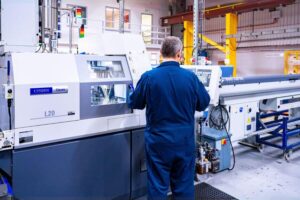Published - 22nd May 2025
Precision-machined components are central to the performance and reliability of systems in sectors such as aerospace, energy, defence and industrial automation. The right machining services support cost-effective product development, compliance with rigorous standards, and scalable production.
For B2B buyers and engineers at OEMs, Primes and Tier 1 suppliers, selecting a machining partner is not just about capability—it’s about risk management, supply chain confidence, and alignment with long-term production needs. An experienced supplier will not only deliver to spec but also contribute engineering insight and metallurgical expertise, and advise on the optimal manufacturing solution for specific parts.
This guide explains the most common types of machining services, explores what to look for in a manufacturing partner, and how Metaltech Precision—a UK-based expert in CNC machining—exemplifies best practice in this field.

Choosing the right machining process depends principally on the geometry of your component, the material, the required tolerance, and your production schedule. Below is a breakdown of commonly used CNC machining methods:
Used to produce cylindrical parts such as shafts, connectors, pins, and bushings. CNC fixed head turning is ideal for medium-to-large parts; CNC sliding head turning excels at high-volume production of small, complex items. Aerospace fasteners and defence components often use sliding head machining due to tight tolerances and repeatability.
Used for large-diameter, heavy components that require stable positioning and vertical access. Components like compressor casings and heavy flanges in the energy sector may require CNC vertical turning.
A versatile method that uses rotating cutters to remove material from flat, contoured or angled surfaces. CNC milling suits parts with multiple faces such as manifolds, mounting plates, and brackets.
These technologies allow access to complex geometries in a single setup. Ideal for aerospace housings, valve blocks, medical enclosures, and other components requiring machining on multiple planes with tight tolerances.
Combine turning, milling, and drilling in one machine. With automated loading, these systems increase throughput and are perfect for high-volume, high-precision work such as industrial connectors and actuator components.
Material selection is a critical factor in determining the machining strategy, tooling and overall cost. Some materials offer excellent machinability but lack strength; others are ideal for harsh environments but increase tool wear and setup time.
The correct choice of material often dictates tooling costs, machining speeds, coolant usage, and even the achievable surface finish. An experienced partner can help you strike the right balance between performance and cost-efficiency.
Component geometry directly affects how a part is machined and the associated cost. Features that seem minor in CAD may translate to longer cycle times or additional setups:
Design decisions impact fixture setup, machine type, cycle time and scrap rate. The earlier machining considerations are integrated into the design phase, the more efficiently a component can be produced. For this reason, an expert machining services company offering advice on Design for Manufacture (DfM) is likely to be a cost-effective choice.
Some suppliers have the expertise to offer trusted advice on the best way to machine specific components. Others offer simulation tools to predict machinability challenges before production begins. In both cases, this focus on component geometry at an early stage can save both time and money.
Procurement and engineering teams should assess potential machining partners based on more than price. Consider the following:
The best machining suppliers act as long-term partners, not just subcontractors. They help you improve part performance, reduce cost, and keep projects on schedule.
Metaltech Precision is a UK-based CNC machining partner with over 50 years’ experience serving B2B buyers in demanding industries. Metaltech meets the highest standards of machining quality and reliability with a comprehensive range of services.
Learn more about Metaltech’s machining capabilities
Leading manufacturers require suppliers that can design and manufacture components quickly, efficiently and to the highest quality, safety and environmental standards.
Metaltech Precision’s machining services support a diverse range of performance-critical industries, each with its specific requirements and challenges:
The most successful manufacturing relationships are true partnerships, where technical expertise flows in both directions to create optimal outcomes. Metaltech Precision has built collaborative relationships with OEMs, Primes, and Tier 1 manufacturers across many performance-critical industries.
The company’s team of engineering experts works closely with customers from initial concept through to full production, providing support that extends far beyond basic manufacturing services. This consultative approach ensures that components are not just manufactured to specification but expertly optimised for their intended application.
Not only does Metaltech offer all the precision machining services and expertise set out above, but customers also benefit from access to UK and global manufacturing options that reduce risk and offer a range of manufacturing solutions:
As global supply chains face increasing challenges, the strategic advantages of working with a UK-based manufacturer have never been more apparent. Metaltech Precision’s Somerset facility provides customers with:
Operating from large, clean and modern facilities, Metaltech offers comprehensive machining capabilities paired with:
Metaltech’s expertise covers every stage of the manufacturing process, so that customers benefit from a fully integrated UK solution.
As part of Expromet Technologies Group, Metaltech Precision offers customers access to an exceptionally broad range of metal manufacturing capabilities. This group structure enables the company to provide integrated solutions that combine precision machining expertise with complementary processes including:
This synergy enables Metaltech to deliver fully integrated, world-class engineering solutions, drawing on the technical expertise and supply chain strength of the entire group. Customers benefit from advice on the best choice of materials and manufacturing methods, and supply chain options including global sourcing for cost-sensitive components.
For B2B buyers managing complex supply chains, working with a partner that offers both machining and casting as well as fabrication provides:
This integrated approach is especially beneficial in performance-critical sectors such as aerospace, energy and defence, where compliance and performance are non-negotiable.
✅ Can the supplier machine your material, including exotics?
✅ Do they hold sector-specific certifications (AS9100, ISO 14001)?
✅ Do they have in-house inspection and reporting systems?
✅ Can they support prototyping?
✅ Are they able to scale for serial or high-volume parts?
✅ Do they offer technical guidance, eg DfM input and choice of manufacturing process?
✅ Can they integrate machining with casting or fabrication if required?
✅ Are they able to offer UK manufacturing services if needed?
If you’re sourcing precision-machined metal components and want a supplier that aligns with your technical, commercial and operational needs, Metaltech Precision can help.
Contact us to discuss your next project.
How fast can you produce a machined part?
Lead times vary based on complexity and batch size. Quick-turn services can deliver simple parts completed within tight timelines.
What tolerances are typically achievable?
Most CNC machining can maintain tolerances of ±0.01mm. Tighter tolerances are possible with specialist setups and inspection.
What finishes are available?
Machined components can be left as-milled, or finished with anodising, plating, bead blasting, or painting.
Can I supply my own raw materials?
Yes, but many manufacturers prefer to source materials to ensure quality and traceability.
How do I ensure the part is manufacturable?
Work with your machining partner early in the process for DfM advice. They’ll guide material choice, tolerances, and geometry refinements.
If you have a project, talk to our experienced sales team
Contact us


